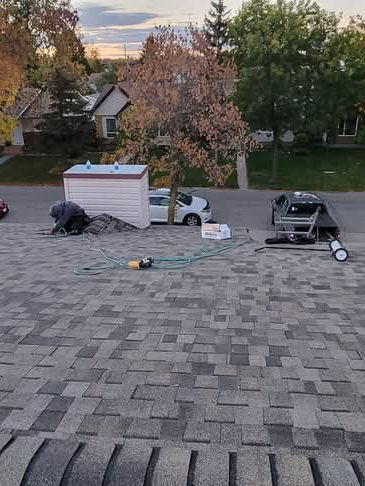
Winnipeg Roofing Services
Why Keeping Your Roof in Good Shape is Essential
Understanding the key factors that impact your roof’s condition is essential not just for maintaining your property, but also for recognizing the long-term benefits of regular inspections and upkeep. After all, wouldn’t you agree that proactive maintenance can save you a lot of headaches down the line?

1
Protection from the Elements
The roof is the primary barrier protecting a building from weather conditions like rain, snow, heat, and wind. A compromised roof can lead to water leaks, which can cause damage to ceilings, walls, and even the foundation.
2
Energy Efficiency
A roof in poor condition, especially one with gaps, leaks, or insulation problems, can lead to energy loss. Heat can escape in winter, and cool air can escape in summer, forcing HVAC systems to work harder and increasing energy bills.
3
Structural Integrity
The roof plays a critical role in the overall structural integrity of a building. Water leaks and structural damage from an aging roof can affect the framing, insulation, and even the foundation over time, leading to costly repairs.
4
Home Value
A well-maintained roof contributes to the curb appeal and resale value of the property. Buyers are often wary of homes with roofing issues, which could lower the price or lead to a deal falling through.
5
Safety
A roof in bad shape can present safety risks, both for the building's occupants and those working on it. For example, water intrusion could weaken ceilings, causing them to collapse or create dangerous mold growth, which is a health hazard.
6
Insurance Coverage
Many insurance policies have stipulations that require regular maintenance on the roof to stay valid. A damaged roof could also make it more difficult to file a claim or could lead to higher premiums.

Are you having a hard time considering whether a metal roof or shingles are for you?
When comparing architectural shingles and a metal roof, there are several key differences in terms of durability, cost, aesthetics, and maintenance. Here's a breakdown:
01
Materials
Architectural Shingles: These are asphalt-based shingles with multiple layers that give them a thicker, more textured look than traditional 3-tab shingles. They're designed to mimic the appearance of wood or slate but are made from fiberglass and asphalt.
Metal Roof: Typically made from steel, aluminum, copper, or zinc, metal roofing can come in panels or shingles. It's known for its durability and lightweight nature.
03
Cost
Architectural Shingles: Generally more affordable upfront than metal roofing, making it a more budget-friendly option.
Metal Roof: A metal roof is significantly more expensive upfront, depending on the material used. However, the longer lifespan and reduced maintenance costs can make it more cost-effective in the long run.
05
Maintenance
Architectural Shingles: Typically require more maintenance over time. Regular inspections are needed to check for damaged shingles, cracked sealants or leaks. Replacing damaged shingles is fairly simple.
Metal Roof: Requires less maintenance overall. It is more resistant to moss, algae, and mildew growth. However, it still needs periodic inspections, especially for rust or damage to the seams.
07
Noise
Architectural Shingles: These tend to absorb sound, so they are quieter during rain and hailstorms compared to metal roofs.
Metal Roof: Metal roofs can be noisy during heavy rain or hail. However, this issue can be mitigated with proper insulation and underlayment.
09
Environmental Impact
Architectural Shingles: Traditional asphalt shingles are not as environmentally friendly because they contribute to landfill waste when replaced. However, some manufacturers offer recyclable versions.
Metal Roof: Metal roofs are generally considered more eco-friendly. They are often made from recycled materials and can be fully recycled at the end of their life, making them a more sustainable option.
02
Durability
Architectural Shingles: They can last 20-30 years, depending on the quality of the shingles and the climate. They are more prone to wear from extreme weather conditions like high winds, hail, or heavy snow compared to metal roofs.
Metal Roof: Known for its exceptional durability, a metal roof can last 40-70 years (or more) with minimal maintenance. It is resistant to harsh weather, including wind, hail, and fire. Metal roofs are also less prone to cracking, warping, or curling over time.
04
Aesthetics
Architectural Shingles: These provide a more traditional, layered look. They come in various colors and textures, allowing homeowners to achieve different styles, from a classic look to a more upscale, dimensional aesthetic.
Metal Roof: Metal roofs have a sleek, modern appearance. They can also mimic the look of other materials, such as wood or slate. Metal roofs are available in a variety of colors and finishes but are generally more associated with a contemporary or industrial aesthetic.
06
Energy Efficiency
Architectural Shingles: These shingles absorb heat, which can lead to higher cooling costs during hot months. However, some shingles come with reflective coatings that improve energy efficiency.
Metal Roof: Known for being highly energy-efficient. Metal roofs reflect sunlight, which can help keep the interior of the building cooler and reduce cooling costs. Some metal roofs even have reflective coatings to enhance energy efficiency.
08
Weight
Architectural Shingles: They are relatively lightweight compared to metal roofs, making them easier to install in many situations.
Metal Roof: Metal roofs are lightweight as well, but the panels can be heavier depending on the material. However, even heavier metal roofs are still lighter than many other roofing options like tile or slate.
10
Installation
Architectural Shingles: Easier and quicker to install, which reduces labor costs, depending on slope of course.
Metal Roof: Installing a metal roof is more labor-intensive and requires specialized knowledge, which can increase installation costs. However, the installation time is usually shorter than for tile or slate roofs.
CONTACT
Do you have a project in mind?
Contact us today and let us help get the job done right!
(204) 698-7313







